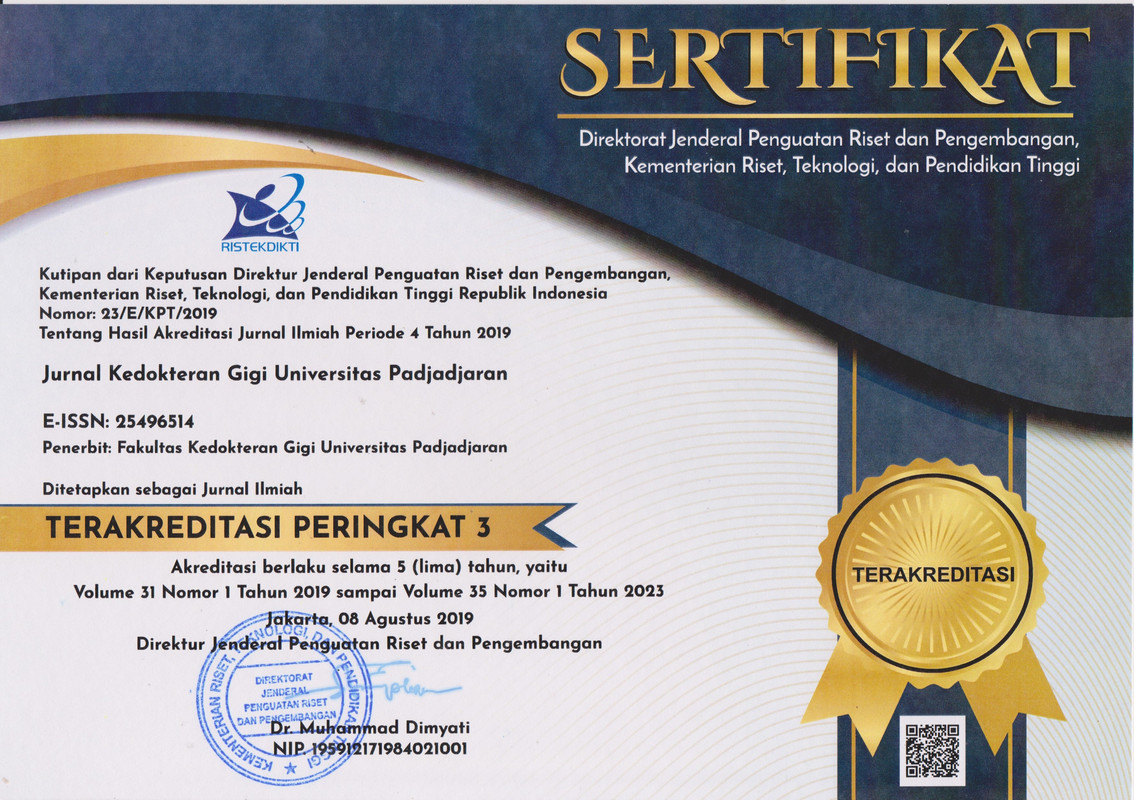Evaluasi faktor risiko mukositis oral pada pasien kanker kepala dan leher
Evaluation of risk factors for oral mucositis in head and neck cancer patientsAbstract
ABSTRAK
Pendahuluan: Mukositis oral merupakan efek samping perawatan kemoterapi dan/atau radioterapi untuk perawatan kanker kepala dan leher yang mengganggu asupan gizi sehingga menurunkan kualitas hidup pasien. Laporan kasus ini bertujuan untuk mengevaluasi faktor risiko yang memengaruhi keparahan dan perawatan mukositis oral dua pasien anak dan dewasa kanker kepala dan leher yang menjalani radioterapi dan kemoterapi. Laporan kasus: Kasus pertama, perempuan usia 15 tahun dengan kanker nasofaring stadium II (KNF) yang menjalani kemoterapi siklus ke-3. Pemeriksaan intraoral didapatkan lesi ulserasi dan eritema pada mukosa labial atas dan bawah dan oral hygiene (OH) baik. Kasus kedua, perempuan usia 42 tahun dengan kanker sinonasal stadium III post hemimaksilektomi yang menjalani radioterapi siklus ke-17. Pemeriksaan ekstraoral didapatkan fisur eritema pada sudut mulut. Pemeriksaan intraoral ditemukan ulser multipel dan erosi pada mukosa labial, palatum dan dorsum lidah serta OH yang buruk. Diagnosis lesi oral kasus pertama yaitu mukositis oral tingkat II dan kasus kedua yaitu mukositis oral tingkat III. Pasien pertama diberikan larutan NaCl 0,9% dan hidrokortison salep. Pasien kedua diberikan diphenhydramine, nystatin, klorheksidin diglukonat, dan parasetamol. Kedua pasien menunjukkan penyembuhan yang baik setelah terapi awal. Faktor risiko keparahan mukositis oral kedua kasus ialah usia, jenis kelamin, kebersihan mulut, tipe dan stadium kanker, agen kemoterapi, daerah radiasi, fraksionasi, frekuensi, dosis kumulatif dan volume mukosa teradiasi. Simpulan: Perbedaan tingkat mukositis oral yang terjadi pada dua kasus pada laporan ini dapat dikarenakan perbedaan usia, tingkat oral hygiene, dosis kemoterapi maupun radioterapi, dan stadium kanker pada pasien. Evaluasi faktor risiko dan tindakan preventif diperlukan pada pasien yang menjalani kemoterapi ataupun radioterapi guna terhindar dari mukositis oral yang parah dan dapat menurunkan kualitas hidup.
Kata kunci: faktor risiko; kemoterapi; mucositis; radioterapi; kanker
ABSTRACT
Introduction: Oral mucositis is a side effect of chemotherapy and radiotherapy for treating head and neck cancer that interferes with nutritional intake, thereby reducing the patient's quality of life. This case report evaluates the risk factors influencing the severity and treatment of oral mucositis in two pediatric and adult head and neck cancer patients undergoing radiotherapy and chemotherapy. Case report: The first case was a 15-year-old woman with stage II nasopharyngeal cancer (NPC) who underwent third cycle chemotherapy. Intraoral examination revealed ulcerated and erythematous lesions on the upper and lower labial mucosa and good oral hygiene (OH). The second case was a 42-year-old woman with stage III sinonasal cancer after hemimaxillectomy who underwent radiotherapy in the 17th cycle. Extraoral examination revealed an erythematous fissure at the corners of the mouth. Intraoral examination revealed multiple ulcers and erosions on the tongue's labial, palate, and dorsum and poor OH. In the first case, the diagnosis of oral lesions was grade II oral mucositis and in the second case was grade III oral mucositis. The first patient was given 0.9% NaCl solution and hydrocortisone ointment. The second patient was given diphenhydramine, nystatin, chlorhexidine digluconate, and paracetamol. Both patients showed good recovery after initial therapy. The risk factors for the severity of oral mucositis in both cases were age, sex, oral hygiene, type and stage of cancer, chemotherapeutic agents, radiation area, fractionation, frequency, cumulative dose and volume of irradiated mucosa. Conclusions: The difference in the level of oral mucositis that occurred in the two cases in this report could be due to differences in age, level of oral hygiene, doses of chemotherapy and radiotherapy, and stage of cancer in patients. Evaluation of risk factors and preventive measures are needed in patients undergoing chemotherapy or radiotherapy to avoid severe oral mucositis and reduce the quality of life.
Keywords: risk factors; chemotherapy; mucositis; radiotherapy; cancer
Keywords
Full Text:
PDFReferences
DAFTAR PUSTAKA
Daugėlaitė G, Užkuraitytė K, Jagelavičienė E, Filipauskas A. Prevention and treatment of chemotherapy and radiotherapy induced oral mucositis. Medicina (Kaunas). 2019 22;55(2):25. DOI: 10.3390/medicina55020025.
Campos MI, Campos CN, Aarestrup FM, Aarestrup BJ. Oral mucositis in cancer treatment: Natural history, prevention and treatment. Mol Clin Oncol. 2014;2(3):337-40. DOI: 10.3892/mco.2014.253.
Kusiak A, Jereczek-Fossa BA, Cichońska D, Alterio D. Oncological-therapy related oral mucositis as an interdisciplinary problem-literature review. Int J Environ Res Public Health. 2020;17(7):2464. DOI: 10.3390/ijerph17072464.
Curra M, Soares Junior LAV, Martins MD, Santos PSDS. Chemotherapy protocols and incidence of oral mucositis. An integrative review. Einstein (Sao Paulo). 2018;16(1):eRW4007. DOI: 10.1590/s1679-45082018rw4007.
Hurrell L, Burgoyne L, Logan R, Revesz T, Gue S. The Management of pediatric oncology inpatients with oral mucositis. J Pediatr Hematol Oncol. 2019;41(8):e510-6. DOI: 10.1097/MPH.0000000000001546.
Yarom N, Ariyawardana A, Hovan A, Barasch A, Jarvis V, Jensen SB, et al. Systematic review of natural agents for the management of oral mucositis in cancer patients. Support Care Cancer. 2013;21(11):3209-21. DOI: 10.1007/s00520-013-1869-5.
Hong BY, Sobue T, Choquette L, Dupuy AK, Thompson A, Burleson JA, Salner AL, Schauer PK, Joshi P, Fox E, Shin DG, Weinstock GM, Strausbaugh LD, Dongari-Bagtzoglou A, Peterson DE, Diaz PI. Chemotherapy-induced oral mucositis is associated with detrimental bacterial dysbiosis. Microbiome. 2019;7(1):66. DOI: 10.1186/s40168-019-0679-5.
Van Sebille YZ, Stansborough R, Wardill HR, Bateman E, Gibson RJ, Keefe DM. Management of mucositis during chemotherapy: from pathophysiology to pragmatic therapeutics. Curr Oncol Rep. 2015;17(11):50. DOI: 10.1007/s11912-015-0474-9.
Pulito C, Cristaudo A, Porta C, Zapperi S, Blandino G, Morrone A, Strano S. Oral mucositis: the hidden side of cancer therapy. J Exp Clin Cancer Res. 2020;39(1):210. DOI: 10.1186/s13046-020-01715-7.
Mallick S, Benson R, Rath GK. Radiation induced oral mucositis: a review of current literature on prevention and management. Eur Arch Otorhinolaryngol. 2016;273(9):2285-93. DOI: 10.1007/s00405-015-3694-6.
Sufiawati I, Subita GP. Identifikasi dan pengendalian faktor risiko mukositis oral selama radioterapi kanker nasofaring. J Dent Indones. 2013;15(2):155–62. DOI: 10.14693/jdi.v15i2.73
Traktama DO, Sufiawati I. Oral mucositis severity in patient with head and neck cancer undergoing chemotherapy and/or radiotherapy. Maj Ked Gi Indo. 2018;4(1):52. DOI: 10.22146/majkedgiind.33709
Lalla RV, Saunders DP, Peterson DE. Chemotherapy or radiation-induced oral mucositis. Dent Clin North Am. 2014;58(2):341–9. DOI:10.1016/j.cden.2013.12.005
Ribeiro ILA, Limeira RRT, Dias de Castro R, Ferreti Bonan PR, Valença AMG. Oral mucositis in pediatric patients in treatment for acute lymphoblastic leukemia. Int J Environ Res Public Health. 2017 Nov 28;14(12):1468. DOI: 10.3390/ijerph14121468.
Rodríguez-Caballero A, Torres-Lagares D, Robles-García M, Pachón-Ibáñez J, González-Padilla D, Gutiérrez-Pérez JL. Cancer treatment-induced oral mucositis: A critical review. Int J Oral Maxillofac Surg. 2012;41(2):225–38. DOI: 10.1016/j.ijom.2011.10.011
Chaveli-López B, Bagán-Sebastián JV. Treatment of oral mucositis due to chemotherapy. J Clin Exp Dent. 2016;8(2):e201-9. DOI: 10.4317/jced.52917.
Yamamoto H, Ishihara K, Takeda Y, Koizumi W, Ichikawa T. Changes in the mucus barrier during cisplatin-induced intestinal mucositis in rats. Biomed Res Int. 2013:276186. DOI: 10.1155/2013/276186
De Ruysscher D, Niedermann G, Burnet NG, Siva S, Lee AWM, Hegi-Johnson F. Radiotherapy toxicity. Nat Rev Dis Prim. 2019;5(1). DOI: 10.1038/s41572-019-0064-5
Brieger K, Schiavone S, Miller FJ Jr, Krause KH. Reactive oxygen species: from health to disease. Swiss Med Wkly. 2012;142:w13659. DOI: 10.4414/smw.2012.13659.
Sonis ST. Oral mucositis. Anticancer Drugs. 2011;22(7):607-12. DOI: 10.1097/CAD.0b013e3283462086.
Cardona A, Balouch A, Abdul MM, Sedghizadeh PP, Enciso R. Efficacy of chlorhexidine for the prevention and treatment of oral mucositis in cancer patients: a systematic review with meta-analyses. J Oral Pathol Med. 2017;46(9):680-8. DOI: 10.1111/jop.12549.
Maria OM, Eliopoulos N, Muanza T. Radiation-Induced Oral Mucositis. Front Oncol. 2017;7(may):1–23. DOI: 10.3389/fonc.2017.00089
Sroussi HY, Epstein JB, Bensadoun RJ, Saunders DP, Lalla RV, Migliorati CA, Heaivilin N, Zumsteg ZS. Common oral complications of head and neck cancer radiation therapy: mucositis, infections, saliva change, fibrosis, sensory dysfunctions, dental caries, periodontal disease, and osteoradionecrosis. Cancer Med. 2017;6(12):2918-31. DOI: 10.1002/cam4.1221.
Coracin FL, Santos PS, Gallottini MH, Saboya R, Musqueira PT, Barban A, Chamone Dde A, Dulley FL, Nunes FD. Oral health as a predictive factor for oral mucositis. Clinics (Sao Paulo). 2013;68(6):792-6. DOI: 10.6061/clinics/2013(06)11.
Saito H, Watanabe Y, Sato K, Ikawa H, Yoshida Y, Katakura A, Takayama S, Sato M. Effects of professional oral health care on reducing the risk of chemotherapy-induced oral mucositis. Support Care Cancer. 2014;22(11):2935-40. DOI: 10.1007/s00520-014-2282-4.
DOI: https://doi.org/10.24198/jkg.v33i3.33564
Refbacks
- There are currently no refbacks.
Copyright (c) 2022 Jurnal Kedokteran Gigi Universitas Padjadjaran
INDEXING & PARTNERSHIP

Jurnal Kedokteran Gigi Universitas Padjadjaran dilisensikan di bawah Creative Commons Attribution 4.0 International License






.png)

















